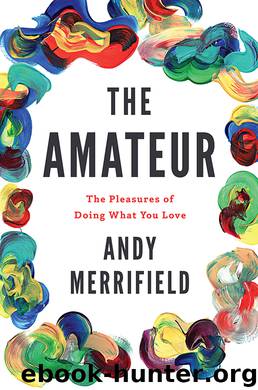The Amateur by Andy Merrifield

Author:Andy Merrifield
Language: eng
Format: epub
Publisher: Verso Books
So, too, do we play with our condition in order to realise it. We model our movements on mechanisms that regulate one another. Our being, Sartre would have said of us, is ‘wholly one of ceremony’.
Sartre portrays a bleak social and psychological process: breaking out of bad faith with sincerity, through self-recovery, isn’t so simple. When you’ve succeeded in persuading yourself that bad faith is really good faith, and find that you get rewarded by society’s bad faith, you’re well on the way to living with yourself, to living with your own inauthentic self. It’s the name of the game for professionals, whether they are aware of it or not. Allotted roles have very definite social rules and norms. They determine what waiters should do, how they play, how they act, how we should act.
We have accepted notions of how we all should behave, what we should look like, how we should represent ourselves to the world. These notions get internalised, perpetuated through ritual and routine, through ideology. They ‘hail’ us into specific categories, interpellate our roles; and usually, willingly or grudgingly, we accept them. We perform as we should. It takes great courage (or folly) to do otherwise, sometimes self-destructive acts of courage, carried out to purge our bad faith, to expel the lie within our own consciousness, to stop performing.
At this point we might return to Alan Harrington and his Crystal Palace. Where Harrington remains correct is in warning us that our dull, deadening routine today is a form of ‘method acting’, a ‘corporate theatre in which all the actors are bit players’.20 The actor and the professional have much in common, Harrington notes: both live and perform on a stage. But they differ from how the great Russian theatre director Konstantin Stanislavsky might have seen it. For Stanislavsky, the actor’s art involves a projection of the self into a role; in the Crystal Palace, the self recedes into a role. All is performance, and the performance is that of the team player.
In the rules of Holacracy, too, the injunction is to perform like a soccer player: you know you must pass to the striker, not because you’re friends with them, but because they’re in the best position to score. Even if you hate that person, you’ll still pass the ball to that role. ‘This is the grand misconception’, Harrington says. ‘The “Organisation is all” had led to all the propaganda on the virtues of team play. We must think in teams. But I am always suspicious.’ What’s needed is the non-team player, someone with an independent inner honesty, someone who affirms the lonely prominence of ‘true commitment’ – ‘otherwise’, Harrington says, ‘we will have to face up to a bunch of turnips on the payroll.’21
Stanislavsky demands inner honesty from his performers; he demands that they become beings ‘for-themselves’, as the existentialists put it. It’s a message we might want to think about. Actors must incarnate their own personalities, build themselves into the character and the role – not simply ‘play the part’.
Download
This site does not store any files on its server. We only index and link to content provided by other sites. Please contact the content providers to delete copyright contents if any and email us, we'll remove relevant links or contents immediately.
Big Magic: Creative Living Beyond Fear by Elizabeth Gilbert(5767)
Paper Towns by Green John(5184)
On Writing A Memoir of the Craft by Stephen King(4938)
The Doodle Revolution by Sunni Brown(4754)
Hyperfocus by Chris Bailey(4114)
Evolve Your Brain by Joe Dispenza(3674)
Unlabel: Selling You Without Selling Out by Marc Ecko(3661)
The Red Files by Lee Winter(3413)
Draw Your Day by Samantha Dion Baker(3358)
The Power of Mindful Learning by Ellen J. Langer(3222)
The Art of Dramatic Writing: Its Basis in the Creative Interpretation of Human Motives by Egri Lajos(3064)
The War Of Art by Steven Pressfield(2957)
Applied Empathy by Michael Ventura(2895)
The 46 Rules of Genius: An Innovator's Guide to Creativity (Voices That Matter) by Marty Neumeier(2853)
How to be More Interesting by Edward De Bono(2790)
Keep Going by Austin Kleon(2759)
Why I Am Not a Feminist by Jessa Crispin(2751)
How to Stop Worrying and Start Living by Dale Carnegie(2718)
You Are Not So Smart by David McRaney(2647)
